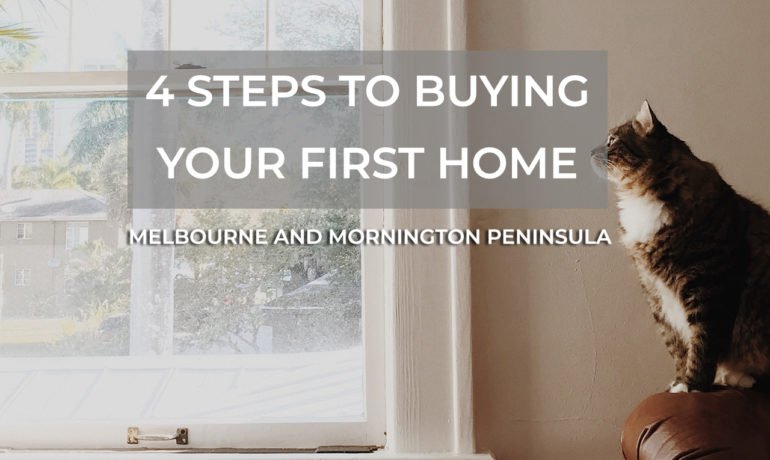Well done for making it here! If you are reading this article it probably means that you have been thinking about buying a home for awhile now and you’re are getting ready to take the plunge and buy your first home.
Real estate is a great investment, and buying your own piece of land has been, and continues to be, an ideal in our Australian culture. If you are thinking to get into the property market in 2020 here are our 4 practical steps for first home buyers.
1. SAVE FOR A DEPOSIT
How much do I have to save for a deposit?
Well, that all depends on the house, townhouse, unit and or apartment that you would like to buy, anything between 10% to 20% of the total of the property price. Ideally 20% so you don’t have to pay LMI (Lender’s Mortgage Insurance). This is a fee that the bank will charge you if you borrow more than 80%. This fee will be included in your mortgage.
Calculate your lender’s mortgage insurance
A big advantage for first home buyers is the exemption of Stamp Duty if you are buying a house less than $600k. If you are buying up to $750k you will get a concession.
First home buyer Stamp Duty
Government grants such as FIRST HOME BUYERS GRANT SCHEME, may be relevant to you.
When done right, property ownership can be a very fulfilling experience, it’s the time when you harvest your many years of hard work. Think about all the parties and night outs you didn’t show up for, and all the dinners at home that were also your lunch the next day. Saving a deposit is a great achievement, give yourself a round of applause.

2. GET A PRE-APPROVAL
The next step after saving for a house deposit is to find out what your borrowing capacity is. At this stage most people engage a mortgage broker to find which lender can give you the best deal. Most brokers provide their services for free as they get paid by the lenders.
Buying a home is a team game, between you, the mortgage broker, conveyancer and real estate agents.
Can I go directly to a lender? Yes you can. However, mortgage brokers usually work with 20+ lenders, so they can easily compare and identify a good loan by comparing them against each other. The best part of it is that the majority are free of charge, because they get paid by the lenders.
Do your research and make sure you are using a reliable and trustworthy mortgage broker.
My wife and I had a mortgage broker who didn’t do his research properly. He told us that we could not get a loan as one of us was on a partner visa. Later we found that this was not actually the case and we were actually eligible for a loan. The inaccurate information he provided us cost us time and emotional stress. Look for good reviews and do your research to make sure you get the best deal and advice.
Once you’ve met with a mortgage broker and established what your borrowing capacity is (how much a bank will lend you based on your income and expenses), you should apply for a pre-approval. What does this mean? A pre-approval is a letter from the lender stating they feel confident that you have the ability to make the necessary down payment and an income that can sufficiently cover your future mortgage payments.
A pre-approval is a very powerful card when negotiating for your property, so make sure you get this before engaging with any real estate agents.
3. RESEARCH AND ASSESS
Most likely you have been looking for houses on Real Estate or Domain, and that’s great! You will start to understand the locations that you can afford and those you cannot. You will see houses with features that you like and others that lack what you need or want. It can be disappointing at times. The Australian market is very expensive and competitive, and good deals go very quickly. Some of them don’t even make it to the market (off market properties).
Roll up your sleeves…it’s time to write down your goals!
A powerful way to achieve your dreams is to write them down! Write a list about the type of property you want – a house, townhouse, unit, apartment or to buy land and build. How many bedrooms or bathrooms is enough for your needs, and will you want your own backyard, or prefer something low maintenance? Accessibility to train stations, shopping centres, schools or parks to suit your lifestyle. Is there an investment strategy that you would apply (subdivision, buy and hold or renovate)?
Split your list into two columns:
DEAL BREAKERS | NEGOTIABLES
Now, go to Real estate or Domain, filter your maximum price according to your borrowing capacity, and have a look at what is out there!
TIP: Start your search with map view to quickly see the areas within your budget!
Free information you can find online:
- Comparable sales (which similar houses were sold in the same area) Real estate or Domain
- Property history (this can be found in the ‘Home Price Guide’) Real estate or Domain
- Suburb profiles Real estate or Domain
- School zones Find My School
- Local facilities or amenities (shops, cafes, bus stops, schools) Google Maps
- Your commute to work Google Maps
- The residential zone where the property is located and any easements on the block Government websites
Engage a conveyancer and give them the heads up that you are looking to buy a house, and that you will need to use their services to review the contracts.
Get quotes from two or three building and pest inspectors mentioning the area that you are looking for a house, and find out their availability to perform an inspection. Having someone to go and inspect the property quickly is an advantage in negotiation.
The real estate industry is very time sensitive, so preparing yourself to act quickly is a huge advantage!
Go for an open inspection, or arrange for the agent to show you the place. Arrive a bit earlier and go for a drive around the block, and if you are very keen try to talk with some neighbours and get some information about the area.
TIP: When you visit the property bring a notebook and take notes of positive or negative details that you might notice. Our memory can play tricks on us. The fact that this is your first home means that you may not really remember all the detail you noticed during your first visit, as there is so much to take in.
Try light switches, appliances, taps, door handles and cabinetry, making sure they all work and are in order. Look for any damages inside and outside the house. If there is something that concerns, mention that to your building and pest inspector as they have the professional knowledge and can check it out. You should only book a building and pest inspection when you are confident in going forward, as a building and pest inspection can cost from $500 up to $800.
If you have found a property that has ticked all the boxes and you feel confident in making an offer, sit down and breathe! This is a crucial factor in the negotiation of the property and shouldn’t be lead by emotions.
4. PLAN A NEGOTIATION
There are some questions you should ask yourself before submitting an offer:
- Do you have a section 32? This document can tell you if the property has any covenants on the title, existing easements on the block, works that haven’t been registered, etc. Ask the real estate agent for this document and bring it to your conveyancer
- Is this something I can afford? Make sure you look at your repayments. What if the interest rates increase, will you still be able to afford it?
- When can I move in? Are you on a rental contract? If yes – can I move out? What are the costs to break the contract? Is it worth it? This is very important in defining your settlement day, in most cases being ready to settle quickly is a big advantage in negotiating.
- Are there offers from other potential buyers?
- How long has the house been on the market? If it has been for a long time, why? Can I use this to my advantage when negotiating?
- Do I know anything about the vendor? Do they want to sell quickly? Are they living there? Is this an investment? How long have they owned this? Are they going to retire? Are they downsizing? Are they in financial distress? Understanding the vendors perspective is so important, however it is up to the real estate agent whether they will release that information to you. Always remember, the real estate agent protects the vendor’s best interest, although they want to sell the house. Always be respectful towards the real estate agent, treating them as you would treat the vendor.
- If there will be an auction, is possible to buy at a fair price before the auction? If you get into an auction, decide what you think the fair price for the property is before going into it. If there is a lot of competition and other bidders get carried away, that’s their problem. Don’t get dragged by emotional decisions.
- If my offer is not accepted how far should I go? Do not compromise on this.

Submitting an offer in a private sale:
Call the agent informing them that you are going to submit an offer and send an email with:
- Your offer on the property
- Your deposit
- Your preferred settlement time frame
- That you wish to make your offer ‘subject to finance’ (even though you have the pre-approval, this protects you if your finance doesn’t go through)
- That you wish to make your offer ‘subject to a Building and Pest Inspection’ (if it’s an old property).
Often your first offer may not be accepted. Be ready to negotiate, and remember: Don’t compromise on what you planned!
TIP: When your offer is accepted, before signing anything get your conveyancer to look at the contract. If you engage a building and pest inspector, ask your conveyancer to change the part of the building and pest inspection where it says “….major structural damages” to “Any property damages over $5000” or to “Building and pest inspection report to our satisfaction”.
My wife and I really liked a property, however we were not sure whether it had structural problems. We signed the contract subject to a building and pest inspection. We thought that we would be fine with that and it’d protect us. When the report came back it showed that the property had “structural damages”, but on the contract it specifically referred to “major structural damages”. Well…the real estate agent wasn’t going to let us pull out of the contract over one word and we were mortified to think that we were stuck with it! Luckily enough we had a good conveyancer that helped us get out of that situation.
Always remember to read your contract and give it to your conveyancer before you sign anything! Some of the language used in contracts can be confusing and complicated, so having a professional that reviews the contract is extremely important.
We hope this article was helpful and you can successfully purchase your first property!
Happy house hunting! : )

Why not engage a professional to take care of the entire buying process with you?
Related Posts
- Buyer's agent v Vendor's agent: What's the difference?
What's a buyers agent? How different are buyers agents from regular real estate agents? This…


